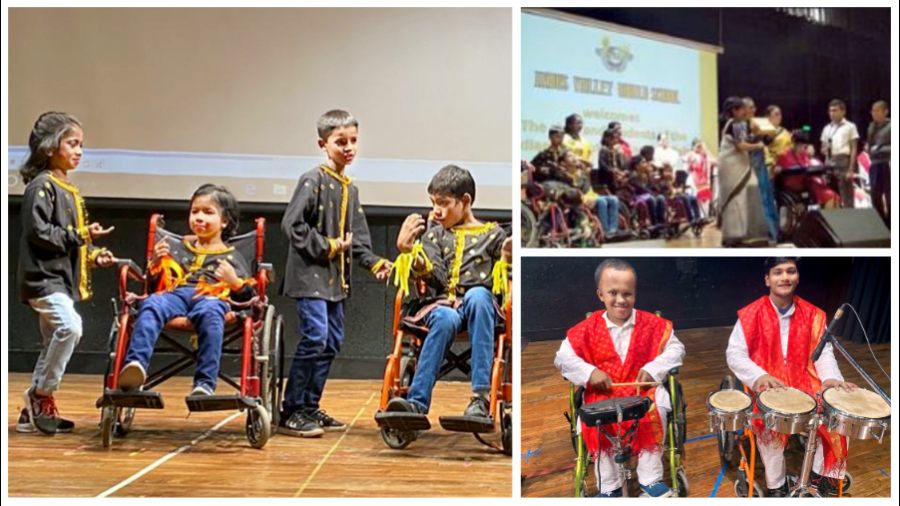- An individual with cerebral palsy that has impacted her speech used a voice output device to communicate with an auditorium full of children in a city school
- A group of students danced not on their feet but on wheelchairs, making patterns on the stage
Students and teachers of the Indian Institute of Cerebral Palsy (IICP) spent a couple of hours in a mainstream school and pupils of the two institutions had the opportunity to interact with each other.
If children without disability see, hear and observe those with disability doing something independently, it takes away the “pity” that is associated with disability and they are able to understand and give credit to their abilities, said an official of IICP.
The children of Indus Valley World School (IVWS) watched the children from IICP sing the same songs and dance to the same tunes.
Teachers of both schools hoped that it would help children understand that it is the same world that they all live in, their interests are the same and so are their little joys.
“Those with disabilities should not feel alienated,” a teacher said.
The students of IICP took the stage and sang a popular Hindi film song, Bum bum bole, and the whole audience joined them in the chorus.
The dance performance had students who use wheelchairs wheeling around on the stage. But it was not fun and music alone. A girl from IICP recounted her story, her struggles and aspirations.
The girl, who wants to be a radio jockey, said that she did not want people to look at her with pity. “They should look at us as human beings, which many people don’t,” she said.
When Barsha Bhattacharya, a trainer at the advocacy group of IICP, went up on stage, the students at IVWS were amazed not at what she spoke but how she communicated using a voice output device through augmentative and alternative communication (AAC).
Their inquisitiveness did not end with her speech. Some of the students, keen to know how the machine worked, walked up to the stage to see the device that she used and the word board that she carried on her lap.
“Seeing for themselves takes away the concept of pity that is associated with disability. There are challenges for them but life does not stop there for them, “ said Madhumita Dasgupta, inclusion coordinator at IICP.
Inclusion does not happen by speaking about it but by providing infrastructure that can make an institution or a place accessible for people with disability. “Your school has ramps,” a student of IICP told a teacher of Indus Valley.
Dasgupta said that for individuals with disability, such opportunities help put across their ideas. “Our students are very keen to mingle,” she said.
Amita Prasad, director of IVWS, said that it is important that children interact and not only be lectured to to be sensitive.
“Seeing evokes admiration. How the children overcome their challenges with their will and perseverance. It is an important life lesson for all our children. To learn and not give up,” said Prasad.
For inclusion to be reality, there has to be regular interaction.
“Everything that fosters inclusivity is valuable. Interactions are like ice breakers and there should be dialogues on holding more programmes and long-term partnerships. A long-term partnership would have a more long-term impact,” said Reena Sen, honorary secretary at IICP.
